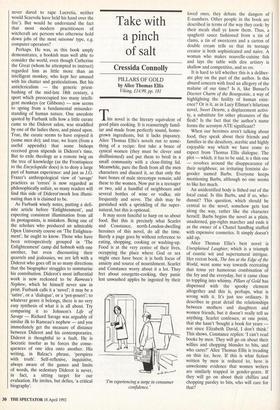Take with a pinch of salt
Cressida Connolly
PILLARS OF GOLD by Alice Thomas Ellis Viking, £14.99, pp. 181 This novel is the literary equivalent of good plain cooking. It is reassuringly famil- iar and made from perfectly sound, home- grown ingredients, but it lacks piquancy. Alice Thomas Ellis's novels run to some- thing of a recipe: first take a brace of cynical women (they must be clever and disillusioned) and put them to broil in a small community with a close-fitting lid. Meanwhile, pare the flesh from all the men characters and discard it, so that only the bare bones of male stereotype remain; add these to the women. Now put in a teenager or two, add a handful of neighbours and several bottles of wine or vodka; stir frequently and serve. The dish may be garnished with a sprinkling of the super- natural, but this is optional.
It may seem fanciful to harp on so about food. But this is precisely what Scarlet and Constance, north-London-dwelling heroines of this novel, do all the time. Barely a page goes by without reference to eating, shopping, cooking or washing-up. Food is at the very centre of their lives, occupying the place where God or sex might once have been: it is both focus of anxiety and source of nourishment. Scarlet and Constance worry about it a lot. They fret about courgette-cooking, they panic lest unwashed apples be ingested by their `I'm experiencing a surge in consumer confidence.' loved ones, they debate the dangers of E-numbers. Other people in the book are described in terms of the way they cook: by their meals shall ye know them. Thus, a spaghetti sauce fashioned from a tin of clams, a tin of sweetcorn and a carton of double cream tells us that its teenage creator is both sophisticated and naive. A woman who makes nouvelle-cuisine fish and lays the table with dire artistry is shallow and competitive, and so on.
It is hard to tell whether this is a deliber- ate ploy on the part of the author. Is this absurd concern with food an allegory of the malaise of our time? Is it, like Bunuel's Discreet Charm of the Bourgeoisie, a way of highlighting the futility of human exist- ence? Or is it, as in Lucy Ellman's hilarious novel, Sweet Deserts, a displacement activi- ty, a substitute for other pleasures of the flesh? Is the fact that the author's name forms the acronym ATE significant?
When our heroines aren't talking about food, they speak about their friends and families in the desultory, acerbic and highly enjoyable way which we have come to expect from Thomas Ellis dialogue. The plot — which, it has to be said, is a thin one — revolves around the disappearance of their neighbour, an irritating feminist do- gooder named Barbs. Everyone keeps mentioning Barbs, although no one seems to like her much.
An unidentified body is fished out of the local canal. Is this Barbs, and if so, who- dunnit? This question, which should be central to the novel, somehow gets lost along the way, rather like the character herself. Barbs begins the novel as a plain, unadorned, gay-rights marcher and ends it as the owner of a Chanel handbag stuffed with expensive cosmetics. It simply doesn't add up.
Alice Thomas Ellis's best novel is Unexplained Laughter, which is a triumph of caustic wit and supernatural intrigue. Her recent book, The Inn at the Edge of the World, went some way towards recreating that tense yet humorous combination of the fey and the everyday, but it came close to toppling into whimsy. Pillars of Gold has dispensed with the spooky element altogether and this is, perhaps, what is wrong with it. It's just too ordinary. It describes in great detail the relationships between mothers and daughters and women friends, but it doesn't really tell us anything. Scarlet confesses, at one point, that she hasn't 'bought a book for years not since Elizabeth David, I don't think.' This shows. Constance replies: 'I can't read books by men. They will go on about their willies and chopping blondes to bits, and who cares?' Alice Thomas Ellis is treading on thin ice, here. If this is what fiction written by men is reduced to, here is unwelcome evidence that women writers are similarly trapped in gender-genre. If they will go on about their chillies and chopping parsley to bits, who wild care for that?


















































 Previous page
Previous page